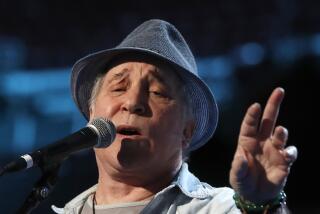PAUL SIMON--BRIDGING THE CULTURE GAP
- Share via
In the first essay in Calendar’s new Popping Off series, William K. Knoedelseder Jr. defended Paul Simon’s decision to record “Graceland” in South Africa, and to use South African musicians. Knoedelseder’s commentary, prompted by protests against Simon by students at Howard University, drew spirited response from readers. Here is a sampling of opinion, the overwhelming majority of which supported Simon’s actions. Popping Off is an occasional forum commenting on timely issues in pop music.
As I was checking in my baggage for the flight to Zimbabwe, my younger brother pressed a cassette into my hand. “It’s Paul Simon’s latest,” he said. “You won’t believe it!”
It was my first trip to Africa. In the excitement of seeing my family and their new Zimbabwe home, the tape was temporarily forgotten. But one bright day, during a family outing, I slipped the cassette into the car’s tape player. We were, quite literally, transformed. When the final song echoed away, my sister asked me whose music that was. Suddenly, the quiet Zulu woman in the back seat leaned forward. “That’s our music,” she whispered. “Do you really listen to us in America?”
I am astonished that anyone--black or white, liberal or conservative--would condemn Simon’s superlative tribute to South African music. To imply that “Graceland” abets, or reflects, any pro-apartheid sentiment is patently foolish. The words and the music celebrate the vitality, talent and strength of the African people.
Each time I listen to “Graceland” I am uplifted, thrilled and saddened. I hear the voices of Zimbabwe all over again. In particular, I hear the voice of that quiet woman in the back seat; she was so proud of those songs, so happy to interpret the language of her people. I wanted to tell her that . . . yes, the people in America do listen to her music. But, I wasn’t sure.
ANNE BELLAMY
North Hollywood
More to Read
The biggest entertainment stories
Get our big stories about Hollywood, film, television, music, arts, culture and more right in your inbox as soon as they publish.
You may occasionally receive promotional content from the Los Angeles Times.










